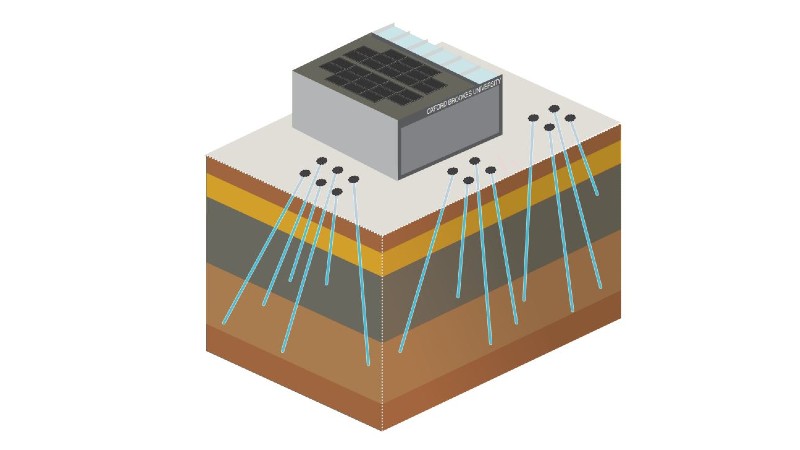Oxford Brookes becomes the first UK university to have state-of-the-art Geo-Exchange Heating System

Oxford Brookes has become the first UK-based university to complete the operational installation of an advanced technology heating system which is predicted to reduce carbon emissions on campus by 20%.
The brand new, state-of-the-art Geo-Exchange Heating System has been installed on the University’s Gipsy Lane site in Headington, Oxford. It will provide approximately 1.2GW of heating per year and replace fossil fuels which have been used until now.
The system is based on a collection of 14 coaxial boreholes, each of which circulates an environmentally friendly glycol in a sealed loop at depths of over 200m, to extract from and store energy in the ground. Two new heat pumps harnessing energy from these boreholes are integrated within Oxford Brookes’ existing systems to satisfy the university's thermal needs.
Jerry Woods, Director of Estates and Campus Services at Oxford Brookes University, said: “This innovative project demonstrates Oxford Brookes’ commitment to the global challenge of climate emergency, and the ambition of reaching net zero.
“We are very proud to be the first UK university to have this pioneering heating technology operational, which will now begin to have a huge impact on reducing our carbon footprint, and moving us towards net zero in the coming years.”
Image: John Hayes, Director of Erda Energy Ltd, Richard Ambrose, Head of Operations at Black Mountain Developments, Professor Joe Tah, ProVice-Chancellor and Dean of Faculty of Technology, Design and Environment at Oxford Brookes University, and Jerry Woods, Director of Estates & Campus Services at Oxford Brookes University
Oxford Brookes’ commitment to becoming greener
Professor of Sustainable Architecture and Climate Change at Oxford Brookes University, Rajat Gupta, a leading figure in sustainable architecture, said: “This pioneering low carbon solution to decarbonise heating at Oxford Brookes will not only help us in significantly reducing our carbon footprint but also demonstrate our commitment to support Oxford city in its journey to net zero carbon emissions as part of Zero Carbon Oxford.
“Outcomes from this Geo-Exchange project could pave the way for future application in other campuses to help them become green.”
This new, low carbon technological innovation was made possible by a £2.3M Public Sector Decarbonisation Scheme grant from the Department for Business, Energy and Industrial Strategy. The work began in November 2021 and became operational on 29 July 2022. The project was delivered in partnership with Black Mountain Developments and Erda Energy Ltd.
Richard Ambrose, Head of Operations at Black Mountain Developments, said: “We are very proud to have worked in collaboration with Oxford Brookes University on this ground breaking Geo-Exchange project.
“Commercial buildings are key in the UK’s response to climate change and will require complete decarbonisation if the UK is to meet its legally binding obligations to meet net zero by 2050. UK Universities are estimated to hold around 10% of our commercial estate and so the leadership that institutions like Oxford Brookes is taking to remove fossil fuels from heating and cooling services could not be more important.
“The project is more than a statement of intent, it is real world action demonstrating Black Mountain Developments, Erda Energy and Oxford Brookes' joint passion and commitment to cutting carbon in response to the climate emergency."
More information about Oxford Brookes’ sustainability targets.
In 2021, Oxford Brookes declared a climate emergency, and also signed up to the Zero Carbon Oxford Charter pledge supporting the city’s aspiration to achieve net zero carbon emissions by 2040.
Main image: Concept image of the project at Oxford Brookes University’s Gipsy Lane site in Headington, Oxford
